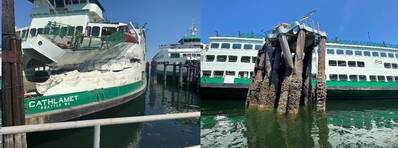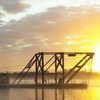Fatigue, Complacency a Factor in Washington State Ferries Allision -NTSB
Fatigue and complacency led to a Washington State Ferries passenger and car ferry striking a mooring structure, or dolphin, at a Seattle ferry terminal last year, the National Transportation Safety Board (NTSB) said Thursday. The contact resulted in $10.3 million in damages to the vessel and $300,000 in damages to the dolphin.
The Cathlamet had crossed the Puget Sound with 94 people on board and was approaching the Fauntleroy Ferry Terminal on July 28, 2022, when it struck the ferry terminal dolphin. One minor injury was reported.
The master, who had the helm, stopped rudder commands about 30 seconds before the contact. The master did not take any action to correct the ferry’s course, slow down or sound the alarm before the contact. He also did not recall what happened and seemed unaware of how the ferry ended up striking the dolphin. Investigators found these events were all consistent with incapacitation from a microsleep, a brief period of sleep lasting a few seconds, due to fatigue.
“Fatigue affects all aspects of human performance, including decision-making, alertness, and reaction time,” NTSB investigators said in the final report. “Mariners should understand the performance effects of sleep loss and recognize the dangers of fatigue, such as microsleeps. When affected by fatigue, mariners should arrange for a qualified watchstander to serve in their place and avoid being on duty when unable to safely carry out their responsibilities.”
The NTSB also found the Cathlamet bridge team exhibited complacency by not complying with Washington State Ferries’ policies when undocking and docking the ferry. The Cathlamet quartermaster did not actively monitor the master as the ferry approached the dock, as required by company policy. Had he done so, he could have quickly taken the helm when the master became incapacitated.
“Complacency occurs when operators repeatedly complete a task without consequence, desensitizing them to its inherent risk,” the report said. “To combat complacency, operators should comply with procedures, such as operating checklists, that are in place to prevent single points of failure, and companies should train operators on the importance of following procedures.”











